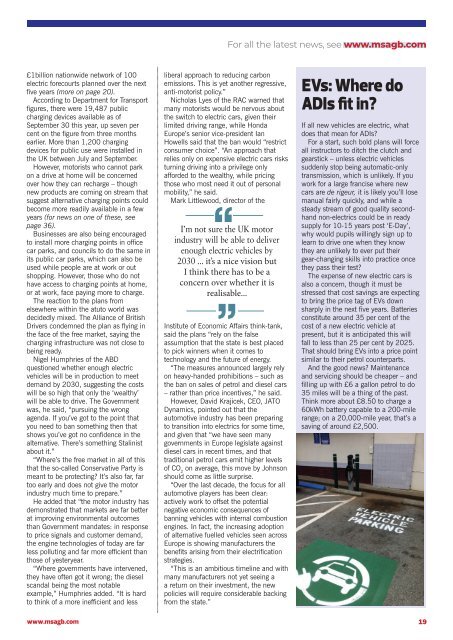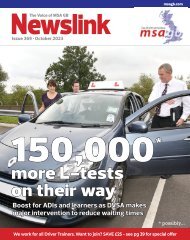You also want an ePaper? Increase the reach of your titles
YUMPU automatically turns print PDFs into web optimized ePapers that Google loves.
For all the latest news, see www.msagb.com<br />
£1billion nationwide network of 100<br />
electric forecourts planned over the next<br />
five years (more on page 20).<br />
According to Department for Transport<br />
figures, there were 19,487 public<br />
charging devices available as of<br />
September 30 this year, up seven per<br />
cent on the figure from three months<br />
earlier. More than 1,200 charging<br />
devices for public use were installed in<br />
the UK between July and September.<br />
However, motorists who cannot park<br />
on a drive at home will be concerned<br />
over how they can recharge – though<br />
new products are coming on stream that<br />
suggest alternative charging points could<br />
become more readily available in a few<br />
years (for news on one of these, see<br />
page 36).<br />
Businesses are also being encouraged<br />
to install more charging points in office<br />
car parks, and councils to do the same in<br />
its public car parks, which can also be<br />
used while people are at work or out<br />
shopping. However, those who do not<br />
have access to charging points at home,<br />
or at work, face paying more to charge.<br />
The reaction to the plans from<br />
elsewhere within the atuto world was<br />
decidedly mixed. The Alliance of British<br />
Drivers condemned the plan as flying in<br />
the face of the free market, saying the<br />
charging infrastructure was not close to<br />
being ready.<br />
Nigel Humphries of the ABD<br />
questioned whether enough electric<br />
vehicles will be in production to meet<br />
demand by 2030, suggesting the costs<br />
will be so high that only the ‘wealthy’<br />
will be able to drive. The Government<br />
was, he said, “pursuing the wrong<br />
agenda. If you’ve got to the point that<br />
you need to ban something then that<br />
shows you’ve got no confidence in the<br />
alternative. There’s something Stalinist<br />
about it.”<br />
“Where’s the free market in all of this<br />
that the so-called Conservative Party is<br />
meant to be protecting? It’s also far, far<br />
too early and does not give the motor<br />
industry much time to prepare.”<br />
He added that “the motor industry has<br />
demonstrated that markets are far better<br />
at improving environmental outcomes<br />
than Government mandates: in response<br />
to price signals and customer demand,<br />
the engine technologies of today are far<br />
less polluting and far more efficient than<br />
those of yesteryear.<br />
“Where governments have intervened,<br />
they have often got it wrong; the diesel<br />
scandal being the most notable<br />
example,” Humphries added. “It is hard<br />
to think of a more inefficient and less<br />
liberal approach to reducing carbon<br />
emissions. This is yet another regressive,<br />
anti-motorist policy.”<br />
Nicholas Lyes of the RAC warned that<br />
many motorists would be nervous about<br />
the switch to electric cars, given their<br />
limited driving range, while Honda<br />
Europe’s senior vice-president Ian<br />
Howells said that the ban would “restrict<br />
consumer choice”. “An approach that<br />
relies only on expensive electric cars risks<br />
turning driving into a privilege only<br />
afforded to the wealthy, while pricing<br />
those who most need it out of personal<br />
mobility,” he said.<br />
Mark Littlewood, director of the<br />
‘‘<br />
I’m not sure the UK motor<br />
industry will be able to deliver<br />
enough electric vehicles by<br />
2030 ... it’s a nice vision but<br />
I think there has to be a<br />
concern over whether it is<br />
realisable...<br />
‘‘<br />
Institute of Economic Affairs think-tank,<br />
said the plans “rely on the false<br />
assumption that the state is best placed<br />
to pick winners when it comes to<br />
technology and the future of energy.<br />
“The measures announced largely rely<br />
on heavy-handed prohibitions – such as<br />
the ban on sales of petrol and diesel cars<br />
– rather than price incentives,” he said.<br />
However, David Krajicek, CEO, JATO<br />
Dynamics, pointed out that the<br />
automotive industry has been preparing<br />
to transition into electrics for some time,<br />
and given that “we have seen many<br />
governments in Europe legislate against<br />
diesel cars in recent times, and that<br />
traditional petrol cars emit higher levels<br />
of CO 2<br />
on average, this move by Johnson<br />
should come as little surprise.<br />
“Over the last decade, the focus for all<br />
automotive players has been clear:<br />
actively work to offset the potential<br />
negative economic consequences of<br />
banning vehicles with internal combustion<br />
engines. In fact, the increasing adoption<br />
of alternative fuelled vehicles seen across<br />
Europe is showing manufacturers the<br />
benefits arising from their electrification<br />
strategies.<br />
“This is an ambitious timeline and with<br />
many manufacturers not yet seeing a<br />
a return on their investment, the new<br />
policies will require considerable backing<br />
from the state.”<br />
EVs: Where do<br />
ADIs fit in?<br />
If all new vehicles are electric, what<br />
does that mean for ADIs?<br />
For a start, such bold plans will force<br />
all instructors to ditch the clutch and<br />
gearstick – unless electric vehicles<br />
suddenly stop being automatic-only<br />
transmission, which is unlikely. If you<br />
work for a large francise where new<br />
cars are de rigeur, it is likely you’ll lose<br />
manual fairly quickly, and while a<br />
steady stream of good quality secondhand<br />
non-electrics could be in ready<br />
supply for 10-15 years post ‘E-Day’,<br />
why would pupils willingly sign up to<br />
learn to drive one when they know<br />
they are unlikely to ever put their<br />
gear-changing skills into practice once<br />
they pass their test?<br />
The expense of new electric cars is<br />
also a concern, though it must be<br />
stressed that cost savings are expecting<br />
to bring the price tag of EVs down<br />
sharply in the next five years. Batteries<br />
constitute around 35 per cent of the<br />
cost of a new electric vehicle at<br />
present, but it is anticipated this will<br />
fall to less than 25 per cent by 2025.<br />
That should bring EVs into a price point<br />
similar to their petrol counterparts.<br />
And the good news? Maintenance<br />
and servicing should be cheaper – and<br />
filling up with £6 a gallon petrol to do<br />
35 miles will be a thing of the past.<br />
Think more about £8.50 to charge a<br />
60kWh battery capable to a 200-mile<br />
range; on a 20,000-mile year, that’s a<br />
saving of around £2,500.<br />
www.msagb.com<br />
19

















